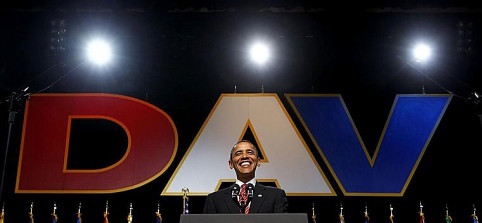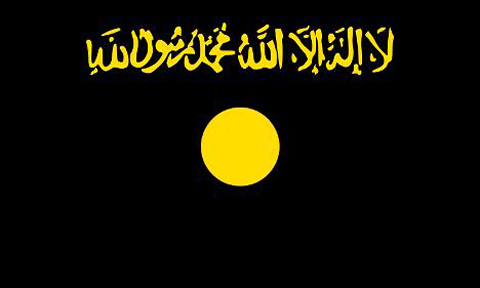
Obama addresses a conference of Disabled American Veterans, August 2, 2010
“Does Obama sound like Bush?” asks the Christian Science Monitor, and answers…
Obama is indeed carrying out an agreement reached by the Bush administration that laid out the timetable for withdrawal.
Gareth Porter at Asia Times Online provides a little more context.
Seventeen months after President Barack Obama pledged to withdraw all combat brigades from Iraq by September 1, 2010, he quietly abandoned that pledge on Monday, admitting implicitly that such combat brigades would remain until the end of 2011.
Obama’s apparent pledge of withdrawal of combat troops by the September 1 deadline in his February 27, 2009, speech generated headlines across the commercial news media. That allowed the administration to satisfy its anti-war Democratic Party base on a pivotal national security policy issue.
At the same time, however, it allowed Obama to back away from his campaign promise on Iraq withdrawal, and to signal to those political and bureaucratic forces backing a long-term military presence in Iraq that he had no intention of pulling out all combat troops at least until the end of 2011.
He could do so because the news media were inclined to let the apparent Obama withdrawal pledge stand as the dominant narrative line, even though the evidence indicated it was a falsehood.
Time Magazine was likewise skeptical about how much change Obama has imposed on the Bush paradigm.
It’s not hard to see why many skeptics see little more than a rebranding message in President Obama’s announcement that U.S. troop levels in Iraq will soon stand at 50,000 and that their mission would be to “train and advise Iraqi security forces, conduct partnered and targeted counterterrorism operations and protect ongoing U.S. civilian and military efforts.”
For one thing, that’s what they’ve been doing for quite some time now, in keeping with the 2008 Status of Forces Agreement (SOFA) concluded between the Bush Administration and the Iraqi government. The SOFA moved U.S. troops out of Iraq’s cities last summer and ended independent U.S. military operations – today they’re required to operate in tandem with Iraqi forces.
And apart from daily bombings and political assassinations, Obama’s perky optimism about American “accomplishments” in Iraq is also belied by many inconvenient factoids.
“Much of the violence has occurred because there is no government, because nobody knows what the future is,” said Anthony Cordesman, a military analyst at the Center for Strategic and International Studies who has periodically advised top U.S. commanders in Baghdad.
In the inconclusive March 7 elections, the heavily Sunni-backed Iraqiya coalition led by former premier Ayad Allawi won 91 seats compared to 89 for Prime Minister Nouri al-Maliki’s mainly Shiite Rule of Law coalition, but neither won the 163-seat majority necessary to govern.
As the political wrangling for allies draws out, insurgents have continued their deadly attacks in what appears to be an attempt to take advantage of the political vacuum to re-ignite sectarian tensions.
But so what if Iraq doesn’t have a government? At least they have a flag!
Suspected Al-Qaeda fighters killed five Iraqi soldiers in a brazen dawn attack Tuesday at a western Baghdad checkpoint and planted the terror group’s black banner before fleeing the scene, officials said.
It was the second time in a week that Al-Qaeda’s flag has appeared at the scene of an attack.
Has all the bloodshed, death and destruction counted for so little?
Yes.


8 comments
Skip to comment form
Author
August 2, 2010
And so on.
going to Iraq and chipping pieces out of the fallen (Berlin) Iraq wall.